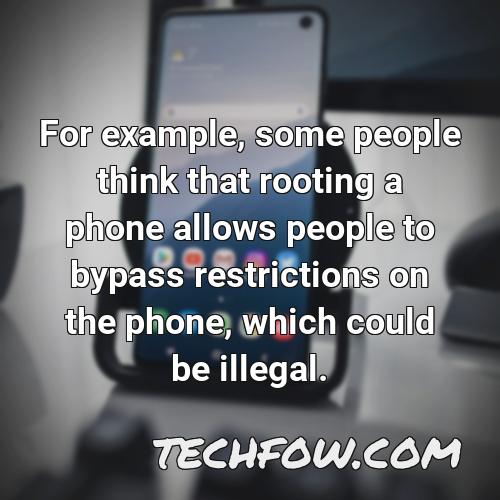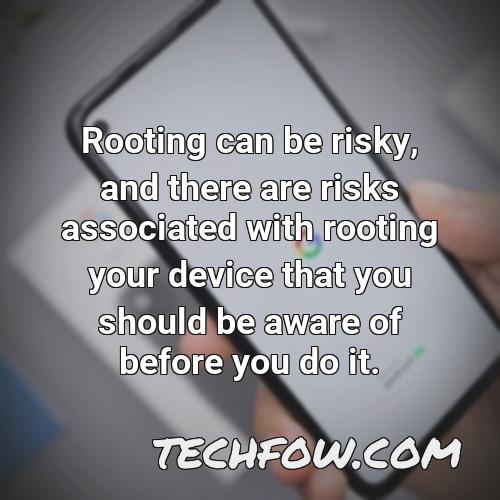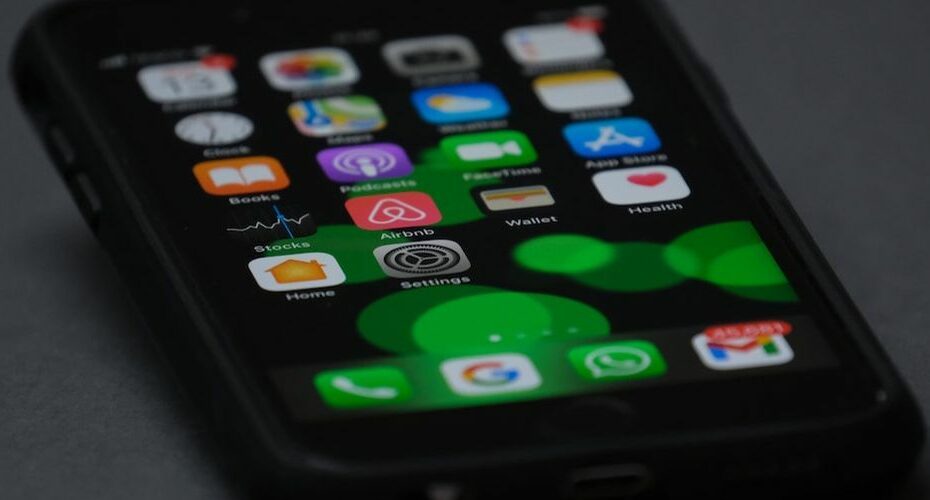Rooting a phone is a process that allows someone to gain administrative access to the phone and change some of its settings. While rooting a phone is technically safe, there are a few things you should keep in mind. First, always make sure you have a backup of your phone before rooting it. Second, be sure to read the instructions that come with the rooting software you are using. Finally, if something goes wrong while rooting your phone, be sure to back up your data and contacts and contact your phone carrier or tech support for help.
The basics
Your phone is probably one of your most important possessions. You rely on it to keep in contact with loved ones, access your favorite apps, and keep track of your schedule. However, it’s important to be careful with what you put in your pockets when you’re out and about. Rooting your phone can make it vulnerable to viruses and other malicious software. So, is rooting your phone safe?
There are a few things to keep in mind when rooting your phone. First, it’s important to be aware of the risks. Rooting your phone can enable you to access your phone’s full capabilities, which could allow attackers to access your data or even take control of your phone. Second, it’s important to make sure you have the right software. Not all rooting software is safe. In fact, some root software can actually damage your phone. Finally, be sure to take all the appropriate safety precautions when rooting your phone. For example, make sure you’re using a safe computer and that you’re backing up your data before you root your phone.

Is Rooting Phone Harmful
Rooting your phone allows you to gain access to the operating system files and settings. This can be used to improve the performance of the phone or to add features that the phone does not have. Rooting can also be used to remove security features that are built into the phone.
Rooting can be a security risk. If you are not familiar with how to root your phone, you may not be able to restore it to its original security settings if something goes wrong. Additionally, if you remove security features from the phone, you may be opening yourself up to increased risks of data theft or corruption.
Ultimately, whether or not rooting your phone is a security risk depends on your own specific situation. If you are comfortable with the risks and have a good understanding of how to root your phone, then rooting may be a good way to improve your phone’s performance or to add features that are not available through the standard operating system. on the other hand, if you are not comfortable with the risks or do not know how to root your phone, then you should not root your phone.

What Happen if I Root My Phone
If you root your Android device, you gain access to the operating system’s code, which gives you the ability to modify the software or install other applications that the manufacturer might not otherwise allow you to. Rooting can be risky, and there are risks associated with rooting your device that you should be aware of before you do it. By understanding those risks, you can decide if rooting is the right thing for you.
There are a few things to consider before you root your Android device. First, you should make sure that you have a compatible device and software. Rooting your Android device will void your warranty, and some devices are not compatible with rooting. Second, rooting your Android device can void your device’s warranty. Third, rooting your Android device can make your device less secure, as you may no longer be protected by Android’s security features. Fourth, rooting your Android device can give you access to your device’s data, which you should be careful about if you plan on storing any sensitive information on your device. Finally, rooting your Android device can interfere with your device’s performance, so you should be aware of any consequences before you do it.
If you decide that you want to root your Android device, there are a few things you need to do before you can start. First, you will need to ensure that your device is fully charged and ready to go. Second, you will need to download and install the rooting software on your device. Third, you will need to enable developer mode on your device. Fourth, you will need to enable USB debugging on your device. Fifth, you will need to enter your device’s unlock code in order to root your device. Sixth, you will need to make sure that your device is connected to the internet, as rooting your device will require access to the Android market. Seventh, you will need to make sure that you have a compatible phone case or device cover. Eighth, you will need to make sure that you have a backup of your device’s data. Ninth, you will need to make sure that you understand the risks associated with rooting your Android device.
Once you have completed all of the above steps, you are ready to root your Android device. To root your device, open the rooting software on your computer and click on the root button. This will start the rooting process, and you will then be able to follow the on-screen instructions to finish the process. Once the rooting process is complete, your device will restart, and you will be able to use

Is It Worth Rooting a Phone
There is a lot of debate over whether or not rooting a phone is worth it. On the one hand, rooting allows a superuser to access more system files and install the wrong app more easily, which can mess up the system. On the other hand, Android is designed in such a way that it’s hard to break things with a limited user profile. A superuser, however, can really trash the system by installing the wrong app or making changes to system files. The security model of Android is also compromised when you have root. So, the decision to root a phone is ultimately up to the user.

Is Rooting Phone a Virus
Some people believe that rooting a phone can be dangerous because it allows a malicious program to take full control of the device. Once the rootkit is installed, it can run applications that can delete or install other programs, and can even steal confidential information. Rooting a phone can also allow someone to track your activity and access your information.

Is Rooted Phone Illegal
Some people think that rooting a phone is a bad thing because it allows people to do things that the phone manufacturer or carrier may not want them to do. For example, some people think that rooting a phone allows people to bypass restrictions on the phone, which could be illegal. However, most Android manufacturers and carriers block the ability to root what’s arguably illegal is the act of circumventing these restrictions. Apple never allows users to jailbreak its devices or install unauthorized software, so jailbreaking is always performed without Apple’s authorization.

What Are Disadvantages of Rooting Android
Rooting an Android device can increase its security risks, void your phone’s warranty, and risk bricking the device.

Is It Better to Have a Rooted or Unrooted Phone
When you get a new phone, you may want to root it so you can install applications from the market that are not compatible or not allowed on the device. This is different than unrooting. With unrooting, you can’t install any applications at all.

Does Rooting Your Phone Delete Apps
Rooting your phone deletes all of the user data and apps that have been installed on the device. This can include things like games, photos, and videos. If you want to keep any of this information, you will need to first unlock the bootloader and then restore the data and apps.

Can You Recover Files After Rooting
When you root your Android phone, you gain access to the system files that are normally hidden. This means that if something goes wrong and your phone crashes, or if you accidentally delete important files, you may not be able to recover them. However, there is a way to recover data if your phone is rooted.
Using a data recovery program like Android Data Recovery, you can easily restore any lost files, including photos, videos, music, and text messages. This program is very easy to use, and will quickly recover any lost data from your rooted Android phone.
All in all
So, is rooting a phone safe? In general, yes. However, always make sure you have a backup of your phone before rooting it, and be sure to read the instructions that come with the rooting software you are using. If something goes wrong while rooting your phone, be sure to back up your data and contacts and contact your phone carrier or tech support for help.

